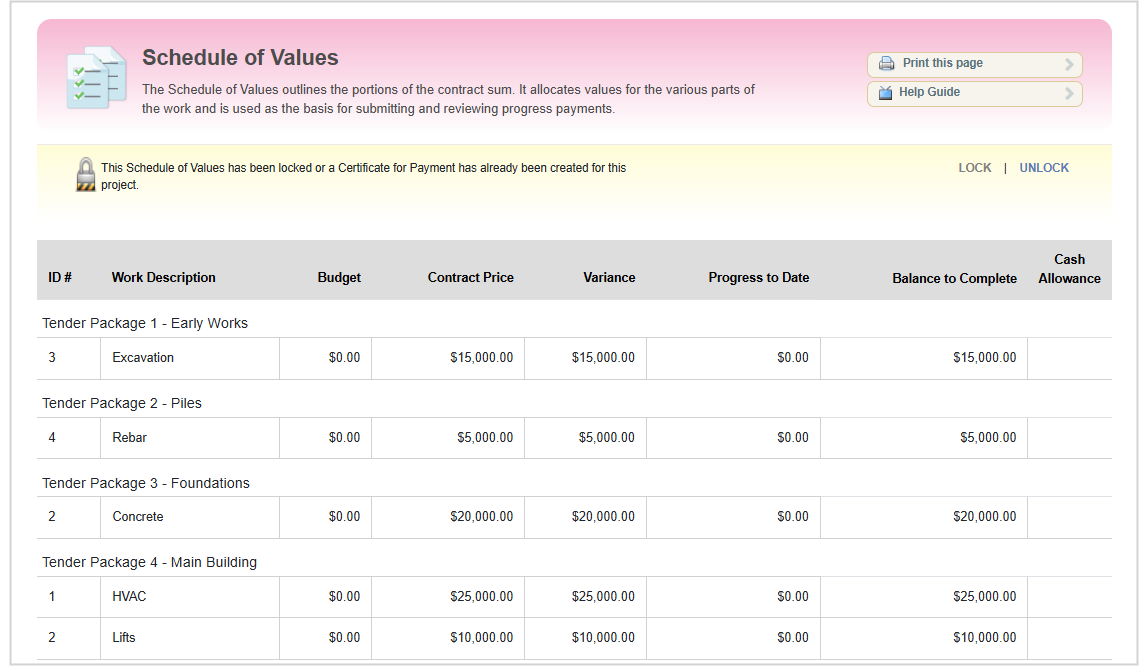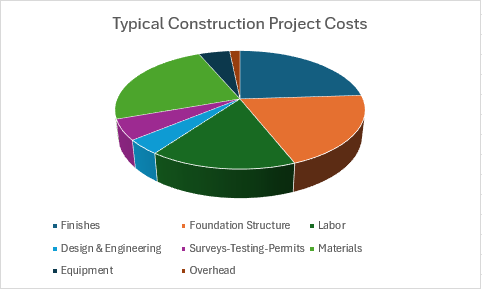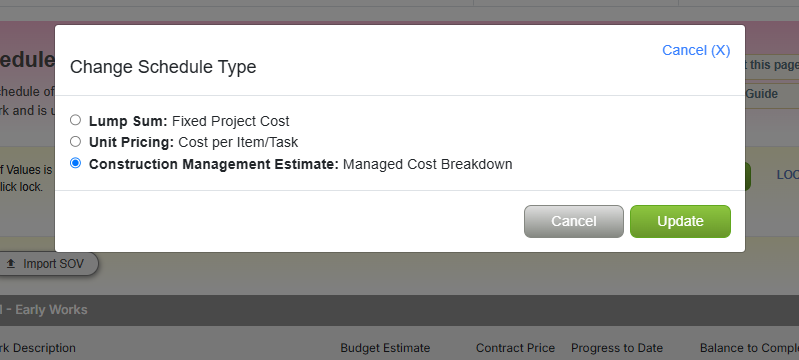The Schedule of Values: Your Construction Project’s Financial GPS

In the complex world of construction, managing finances, tracking progress, and ensuring everyone is on the same page financially are critical. At the heart of these tasks lies a fundamental document: the Schedule of Values (SOV). Far more than just a list of costs, the Schedule of Values acts as a financial roadmap and progress measurement tool for the entire construction project. It’s a key component in construction contract administration.
This blog post delves into what a Schedule of Values is, its purpose, how it’s prepared and used, and why it’s indispensable for the Owner, the Contractor, the Architect/Engineer (or Consultant), and other project consultants involved in a construction project, drawing insights from standard construction contracts like CCDC 2 – 2020 and resources like the CSI Construction Contract Administration Practice Guide.
What is the Schedule of Values?
The Schedule of Values is a document prepared by the Contractor that breaks down the total Contract Price into smaller, distinct components or portions of the Work. Its primary purpose is to serve as the basis for the Contractor’s applications for payment throughout the construction process. By aggregating the values of all parts of the Work, it should total the entire Contract Price.

The structure and required content of the Schedule of Values are typically specified in the Contract Documents. Often, values are itemized according to specification sections. This itemization can follow any form specified in the contract or reasonably required by the Consultant. The format and separation of work activities, sometimes broken down by trades or into separate labor and material categories, can simplify the review and processing of payment applications. The SOV divides the Work into portions that the Architect/Engineer and Owner can observe, measure, and use to determine the percentage of completion.
Preparation and Submission
The responsibility for preparing the Schedule of Values rests with the Contractor. According to CCDC 2 – 2020, the Contractor is required to submit the schedule of values to the Consultant at least 15 calendar days before the first application for payment. Other standard conditions may have slightly different timelines, such as before the first application for payment, within a certain number of days after contract execution (e.g., 7, 10, or 21 days), or even upon execution of the agreement.
The Schedule of Values should be submitted to the Architect/Engineer (or Consultant) and approved before work on the project begins or prior to the submission of the initial pay application. Sometimes, a preliminary draft schedule of values is submitted first to ensure it contains enough detail for approval before the final version is prepared. Once approved by the Architect/Engineer, the approved lists, which would include information from the SOV, are typically distributed to consultants, the owner, and the contractor. The contractor is then responsible for distributing this information to subcontractors and suppliers.
Let’s break down the three primary SOV formats used in the industry—and how RForm’s software supports each to help contract administrators, architects, engineers, and construction managers stay in control.

1. Lump Sum Schedule of Values
Overview: Used most often in stipulated sum contracts or CCDC – 2 stipulated price contract (CCDC-2CcQ Quebec Version), this SOV structure is built around a fixed-price agreement where the scope is clearly defined. The total contract value is divided into high-level categories—often by CSI divisions or major project milestones—with a specific dollar value assigned to each.
Use Case: Design-Bid-Build projects with minimal anticipated changes or design variability.
Key Features:
- Fixed pricing with clear work breakdown
- Straightforward percentage-based progress billing
- Minimal administrative overhead
- Limited adaptability to scope changes
RForm makes Lump Sum SOV management easy with:
- Pre-formatted CSV import templates for rapid setup
- Seamless integration with Certificates for Payment, automatically calculating amounts based on reported progress
- Full synchronization of the SOV with the Certificate for Payment tracking Change Orders, Change Directives and Cash Allowances, ensuring contract value updates flow into your billing structure.
2. Unit Price Schedule of Values
Overview: Common in civil and infrastructure work, this format lists measurable units of work (e.g., cubic meters, square feet) alongside pre-agreed unit prices. Payments are based on quantities installed, which are verified through site reports and field measurements. Otherwise known as CCDC – 4 Unit Price Contract.
Use Case: Roadworks, utility installations, site grading, and any project with repeatable, quantifiable components.
Key Features:
- Scalable billing based on actual work quantities
- Accommodates fluctuating site conditions
- Clear audit trail of quantity-based payments
RForm supports Unit Price contracts by:
- Allowing unit-based SOVs with custom labels and quantity columns
- Providing real-time change tracking, ensuring adjustments in field quantities reflect in payment workflows
3. Construction Management (CM) Schedule of Values
Overview: Used primarily in Construction Management at Risk (CMAR) or Cost-Plus contracts, this format breaks down costs into management-related categories: General Conditions, CM Fees, Trade Contracts, Contingency, and Allowances. This SOV format emphasizes cost transparency and aligns well with open-book accounting practices. CCDC – 5A Construction Management Contract – for services or CCDC – 5B for Services and Construction.
Used primarily in Construction Management at Risk (CMAR) or Cost-Plus contracts, this format breaks down costs into management-related categories: General Conditions, CM Fees, Trade Contracts, Contingency, and Allowances. This SOV format emphasizes cost transparency and aligns well with open-book accounting practices. CCDC – 5A Construction Management Contract – for services or CCDC – 5B for Services and Construction.
Use Case: Large, phased, or multi-stakeholder projects requiring layered cost tracking and collaborative procurement.
Key Features:
- Detailed cost segregation for reporting and auditing
- Supports phased billing and multi-contract projects
- Aligns with Guaranteed Maximum Price (GMP) or Fee-based models
RForm accommodates CM-style SOVs through:
- Support for multi-phase invoicing, enabling ongoing payment certification as packages are executed
- Customizable cost categories
- Automatic integration with Allowances, Change Directives, and Certificates for Payment
Content Beyond the Basics
While the core function is breaking down the total contract amount, a comprehensive Schedule of Values includes specific details that are crucial for financial management and project control:

- All Contract Amounts: It must aggregate to the total Contract Price.
- Contractor’s Profit and Overhead: The Schedule of Values includes the contract amounts, and it’s important to establish whether the contractor’s profit and overhead are included under each item or listed separately.
- General Conditions: Including a specific line item for “general conditions” is helpful. This line item should represent the contractor’s daily “project operational cost” over the duration of the project, establishing a basis for calculating the cost of time extensions if needed.
- Allowances: Allowance items included in the contract are identified as separate items on the Schedule of Values, with their corresponding values indicated. These may require reconciliation.
- Accepted Alternates: These should also be identified as separate line items.
- Specific Project Activities: The SOV should also identify separate line items for administrative and procedural requirements, temporary facilities and controls, mobilization, bonds, insurance, punch list development and updating, final cleaning, operation data, and other services such as facility commissioning.
- Supporting Data: The Contractor may be required to provide evidence such as calculations, quotations, signed subcontracts, or purchase orders from subcontractors and suppliers to substantiate the submitted Schedule of Values.
- Change Orders: As construction proceeds, the Schedule of Values is updated to include amounts authorized by change orders. Change orders are usually added as additional line items. If a change order involves multiple modifications, each item can be listed as a subheading under the total for the change order with a value indicated to facilitate more accurate review for payment.
The Importance of the Schedule of Values
The Schedule of Values is important to multiple parties on a
construction project due to its various functions:

For the Contractor:
- Payment: It is the foundation for preparing and submitting applications for payment. The amount claimed in a progress payment application is for the value of Work performed and Products delivered to the Place of the Work.
- Planning and Resource Allocation: Developing a proportionate Schedule of Values encourages the contractor to give more attention to the allocation of resources and the early planning of later project activities, such as commissioning and demonstration and training.
- Understanding Requirements: It demonstrates the contractor’s understanding of the contract requirements.
- Cash Flow Management: While “front-end loading” (inflating early activity costs) is a deceptive technique to improve cash flow and should be avoided, a properly prepared SOV helps the contractor manage cash flow legitimately by tying payments to measurable progress.
- Supporting Claims: Documentation like detailed accounts and records are necessary for Change Directives and can relate back to the SOV structure when changes affect specific line items.
For the Owner:
- Progress Monitoring: The Owner uses the Schedule of Values in conjunction with the construction schedule to measure the level of progress and quality of work before approving the contractor’s payment application.
- Financial Control: It provides a clear breakdown of the project’s costs and allows the Owner (with the Architect/Engineer) to track expenditures against the planned budget for each work item.
- Payment Verification: It enables the Owner, through the Architect/Engineer’s review, to verify that the amount requested for payment corresponds to the value of the work performed and materials stored.
- Risk Mitigation: Reviewing the SOV helps the Owner (and A/E) identify potential issues like disproportionate values or omissions, contributing to risk mitigation.
For the Architect/Engineer (Consultant):
- Payment Certification: The Architect/Engineer (Consultant in CCDC) is responsible for reviewing the Schedule of Values and using it to evaluate the contractor’s applications for payment. This involves determining the value of the Work performed and Products delivered. They must verify the validity of the application for payment.
- Progress Assessment: The SOV helps the Architect/Engineer determine the percentage of project completion. They review the progress schedule to assess general compliance, and an accurate construction progress schedule reviewed against the SOV is essential when evaluating payment requests, especially on lump-sum projects.
- Review and Verification: The Architect/Engineer reviews the Schedule of Values for accuracy, examines it for obvious omissions or flagrant excesses, and may request substantiating information from the contractor. They shouldn’t dictate the contractor’s costs but should ensure the amounts accurately reflect the value of the work portions.
- Change Management: The Architect/Engineer may review the schedule of values to become familiar with the contractor’s costs for units of work, assisting in evaluating the contractor’s proposals for changes. Updated SOVs incorporating change orders are reviewed as part of the payment process.
- Communication Aid: The approved SOV information is distributed by the Architect/Engineer to consultants and the owner.
The Architect/Engineer acts as an impartial interpreter of the contract documents, including the Schedule of Values, ensuring compliance and facilitating the payment process. While their authority to act or not act doesn’t create a duty to the Contractor or others performing the Work, their role in reviewing and certifying payment based on the SOV is central to contract administration. Disputes related to payments, potentially stemming from disagreements on the value of work listed in the SOV, would be handled through the dispute resolution procedures.
For Other Project Consultants:
- Information Distribution: Consultants typically receive distribution of the approved Schedule of Values information from the Architect/Engineer.
- Coordination: Understanding the value assigned to different portions of the work can aid coordination efforts.
- Closeout Activities: For consultants involved in project closeout activities like commissioning or reviewing O&M data, the Schedule of Values’ specific line items for these tasks help clarify their scope and timing relative to payment milestones.
The Review Process
Reviewing the Schedule of Values is a critical step. The Architect/Engineer is responsible for this review. The review ensures the document provides sufficient detail to facilitate the evaluation of payment applications. It should accurately reflect the value of each portion of the Work

The Architect/Engineer examines the SOV for obvious omissions or flagrant excesses in individual line items. If an item of significant value is omitted or a line item appears excessive and cannot be justified, the schedule is not properly proportioned and must be revised. In case of disagreement, a more detailed presentation or supporting documentation from the contractor can help resolve the issue. The owner and architect/engineer should not attempt to dictate the contractor’s costs for individual items.
Enhancing the payment process involves the contractor and the Architect/Engineer jointly determining quantities or project progress eligible for payment before completing the application forms. This can involve walkthroughs or detailed review of line items from the SOV, sometimes using a preliminary draft submittal process.
The Schedule of Values should be updated to include amounts authorized by change orders as construction proceeds. Records of contract modifications, including change directives and field orders, should be kept, and these updates are reflected in the SOV used for progress payments. The undisputed value of Work performed due to a Change Directive is eligible for inclusion in progress payments while the final amount is determined.
Conclusion
The Schedule of Values is a cornerstone document in construction contract administration for stipulated price contracts. It transforms the lump-sum contract price into a detailed breakdown, providing a vital tool for financial management, progress tracking, and payment certification. From the Contractor who prepares it as the basis for payment applications, to the Owner who uses it to monitor progress and control finances, to the Architect/Engineer (Consultant) who reviews it and certifies payments, and even other consultants who receive the information, the SOV is essential for smooth project execution and clear financial communication. A well-prepared, accurate, and properly maintained Schedule of Values is indispensable for effective contract administration, streamlining the payment process and contributing to a more predictable and successful project.
RForm: Your All-in-One Platform for Financial Workflow Integration
No matter the SOV structure your project demands, RForm’s contract administration software streamlines the setup, management, and integration of payment-related workflows:
✅ Import and configure SOVs via CSV templates
✅ Automatically sync with Change Orders, Directives, and Allowance items
✅ Generate and track Certificates for Payment in a collaborative, auditable manner
✅ Enable role-based access for Owners, Architects, Engineers, and Contractors
✅ Simplify multi-party review and approval tracking
Ready to Simplify Your Contract Financials?
Whether you’re managing five small jobs or 50 complex work packages, RForm empowers your team to maintain precision, reduce administrative friction, and get paid faster.
👉 Join an upcoming webinar or book a personalized demo to see how SOVs in RForm can power your next project with efficiency and clarity.

